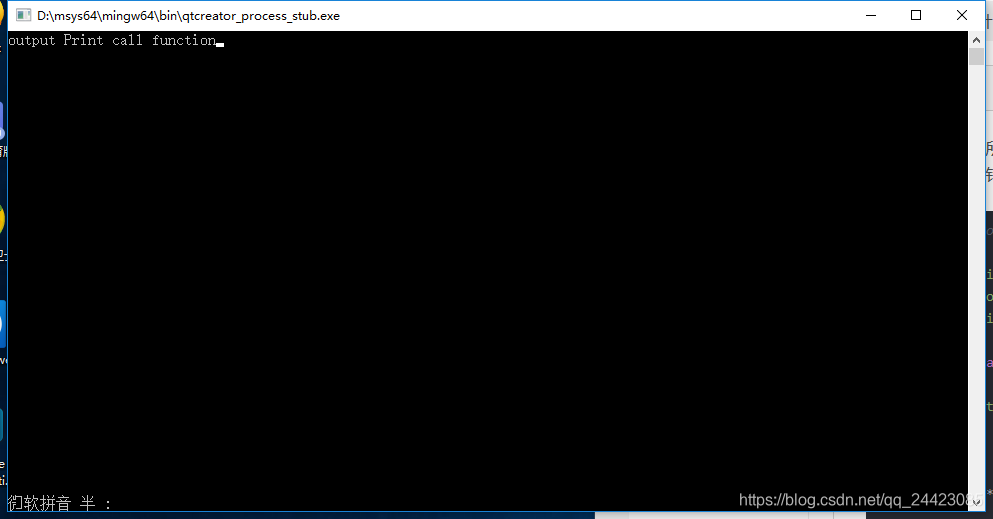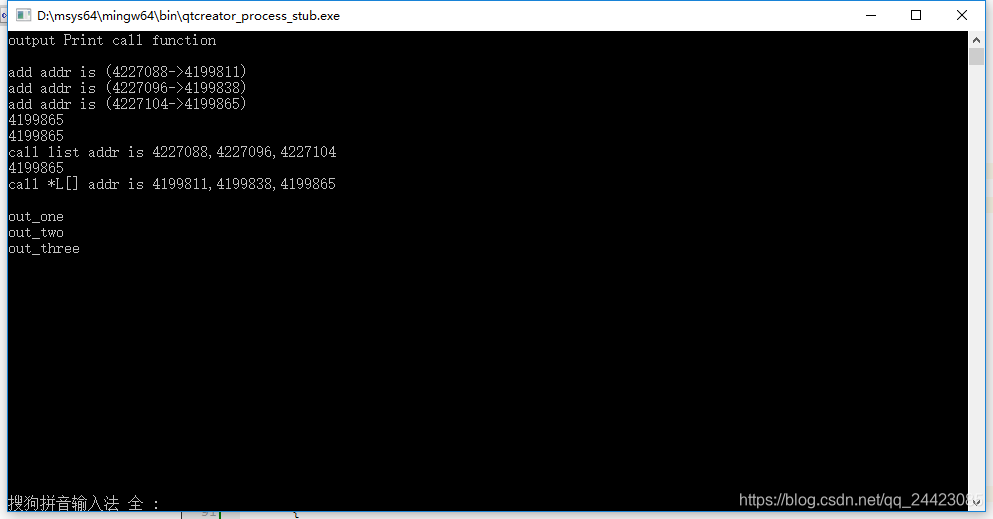函数指针:
对于编译器来说,所有的定义都可以用“变量”来表示,而在C/C++中,拥有强大的地址变量工具,指针。你可以通过指针调用变量,包括定义的指针类型的函数,这里的指针函数具有直接赋值调用的寻址方式。
注:本人开发环境为qtcreator,各位读友可以自动屏蔽环境差别。
代码如下:
//#include <QCoreApplication>
#include <stdlib.h>
#include <stdio.h>
#include <QString>
void output(char* a)
{
printf("output %s",a);
return;
}
typedef void (*P_Fun)(char *);
int main(int argc, char *argv[])
{
// QCoreApplication a(argc, argv);
// return a.exec();
char* a="Print call function";
void (*P_Fun_one)(char *)=output;
P_Fun_one(a);
return 0;
}
执行结果如下:

这种实例的运用方式可能在一些底层代码中见到较多,例如Linux内核源码中。
这种调用的方式可以是这样的调用。如下
1.function.dll &&function.h,首先dll函数是普通函数。
2.U_project (你的源码)。
在你的源码中可以定义
typedef (* Functio_name)(argument) 这样的函数类型
然后赋值调用。
然后想发现新大陆一样,比如现在有一个容器类,里面赋值的都是函数的地址,那么通过索引调用,可以实现一个容器的顺序调用:
这样可以通过封装后的list进行函数调用。
//#include <QCoreApplication>
#include <stdlib.h>
#include <stdio.h>
#include <QString>
void output(char* a)
{
printf("output %s\n",a);
return;
}
typedef void (*P_Fun)(char *);
typedef void (*P_Fun1)();
void out_one()
{
printf("out_one\n");
}
void out_two()
{
printf("out_two\n");
}
void out_three()
{
printf("out_three\n");
}
P_Fun1* b[3]={NULL};
void addlist_pointer(/*P_Fun1* pointer*/)
{
int i=0;
for(i;i<=2;i++)
{
switch (i) {
case 0:
{
static P_Fun1 one_F=out_one;
b[i]=&one_F;
printf("add addr is (%d->%d)\n",&one_F,out_one);
break;
}
case 1:
{
static P_Fun1 tow_F=out_two;
b[i]=&tow_F;
printf("add addr is (%d->%d)\n",&tow_F,out_two);
break;
}
case 2:
{
static P_Fun1 three_F=out_three;
b[i]=&three_F;
printf("add addr is (%d->%d)\n",&three_F,out_three);
break;
}
}
}
printf("%d\n",*b[2]);
}
void calllist_pointer()
{
}
int main(int argc, char *argv[])
{
char* a="Print call function\n";
void (*P_Fun_one)(char *)=output;
P_Fun_one(a);
addlist_pointer();
printf("%d\n",*b[2]);
printf("call list addr is %d,%d,%d\n",b[0],b[1],b[2]);
printf("%d\n",*b[2]);
printf("call *L[] addr is %d,%d,%d\n\n",*b[0],*b[1],*b[2]);
int i=0;
for(i;i<=2;i++)
{
P_Fun1(*(P_Fun1*)b[i])();
}
return 0;
}
发现了一个问题 在addlist_pointer函数里面有一个static 的声明,去掉二级指针指向的地址会自动改变。
估计指针入栈被系统释放掉了。所以加上static 定义到静态区。
结果如下:

指针函数:
int * function(){}
char* function(){}
double* function() {}
这种返回值为指针的函数,叫做指针函数。























 被折叠的 条评论
为什么被折叠?
被折叠的 条评论
为什么被折叠?








